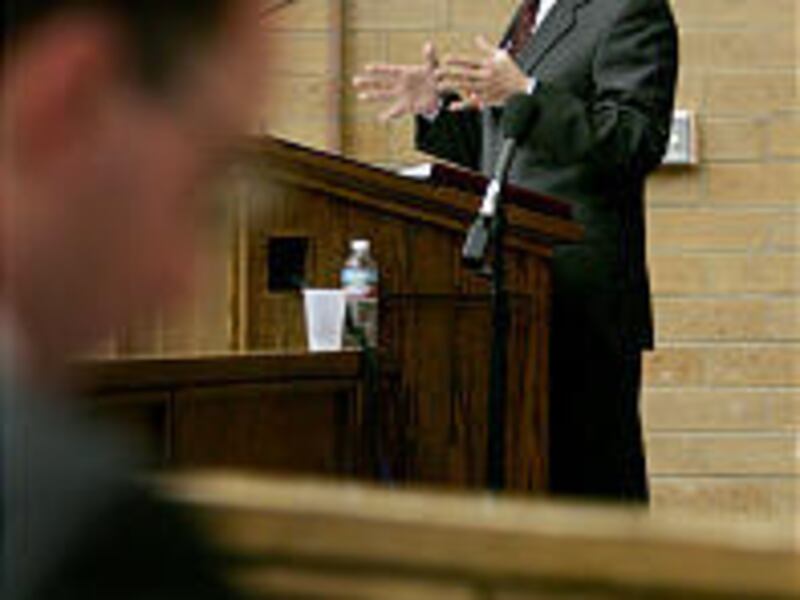PROVO — Kuwait's experience with an American war provides a strong answer to Arabs who question whether the Iraq war was fueled by U.S. imperialism or an oil grab, Kuwait's ambassador to the United States said during a visit to Brigham Young University.
"We tell our Arab friends, look at us," Salem Al-Sabah said last week. "The same thing happened to us. We had 500,000 American troops on our soil. They left. . . . We tell our Arab friends, look at our example. We were occupied, the United States liberated us, asked if there was anything else they could do, and when we said no, they left."
The United States pulled out of Saudi Arabia upon request, too, he noted.
Al-Sabah also predicted an eventual end to the insurgency in Iraq when the strange alliances supporting it collapse.
Since an American-led coalition liberated Kuwait from Saddam Hussein's occupation in the 1991 Persian Gulf War, Kuwait has continued to take positions unpopular in the Arab world.
First, Kuwait requested a continued American military presence — 35,000 soldiers are stationed at three military bases. Then, in 2001, Kuwait was the first country in the region to condemn the Sept. 11 attacks. And in 2003, Kuwait was the only one of Iraq's neighbors to allow U.S. troops to use its border to launch the Iraq war.
More recently, Al-Sabah said, Kuwait was the site of "the biggest military mobilization since World War II."
The U.S. Army secretly used Kuwaiti roads, airports and ports to pull the 3rd Armored Division out of Iraq and replace it with the 4th Armored Division. One-third of Kuwait was cordoned off for the operation, which included 100,000 troops.
"It was the biggest logistical nightmare for our country," Al-Sabah said. "We're the size of New Jersey. I had a lot of sleepless nights."
He defended the war in Iraq on the basis of Saddam's despotism.
"He was a tyrant," the ambassador said. "He was killing his own people. He attacked two of his neighbors. He was using weapons of mass destruction against people in his country. It was time for this. We opened up our border for the attack on Iraq."
Al-Sabah also lashed out at critics who say the United States went to war to grab Iraqi oil wells. Kuwait owns 10 percent of the world's oil reserves.
"It's a ridiculous phenomenon when people say America is there for the oil," he said. "What does that mean? Are they going to take oil without paying for it? They did not take one shipment of oil from Kuwait without paying for it."
A special surprise was waiting for Al-Sabah at BYU, where a distant cousin named Reem Al-Sabah has been working toward a doctorate in clinical psychology since 1998.
Both are members of the Kuwaiti royal family but had not met.
"There is a very supportive environment here at BYU," Reem Al-Sabah said. "Professors and other students called after 9/11 to see if I was bothered by anyone. Luckily, no, I haven't been."
She objected to the conventional wisdom that most Arabs hate Americans.
"Not everyone is anti-American," she said. "That view is wrong. That is a position of the minority."
Kuwait's alliance with the United States is practical for a small country — the population is similar to Utah's at 2.2 million — lodged between Iraq and Saudi Arabia. Iran's coast juts out into the Persian Gulf for an overview of Kuwait's shipping lanes, which became a problem during the Iran-Iraq war in the 1980s. After Iranian strikes on Kuwaiti oil tankers, the U.S. government agreed to fly the American flag on Kuwaiti ships to deter the attacks.
"We get a lot of heat from the neighborhood," Reem Al-Sabah said, "but idealism is one thing and realism is another. We live in reality. We have all these threats in the region, and Kuwait needs to meet those threats however possible, and one of those assets is our relationship with the United States."
The ambassador said Kuwait anxiously awaits the results of Iraq's constitutional council and the upcoming elections in December. The nation has pledged $1.5 billion to the reconstruction of its neighbor.
"The United States has to be in the region," he said. "If Iraq devolves into a civil war, the war will spread, chaos will spread."
Al-Sabah said the insurgency is comprised of three groups — former members of Saddam's regime, al-Qaida infiltrators and prisoners released by Saddam just before the U.S. attack — that cannot long work together.
He said the released prisoners are engaged in organized crime — the reason so many attacks are aimed at police — and set up most strikes, then turn the actual bombings over to others.
"You have an expression, 'strange bedfellows,' " Al-Sabah said in an interview after his lecture. "The insurgency is a collection of strange bedfellows. That tells me these can't go on forever."
The ambassador stressed his tiny country's importance to U.S. interests in the Arab world as it deals with an unstable Iraq and uncertain Iran. He quoted former U.S. Secretary of State Colin Powell, who last year called Kuwait "indispensable."
Al-Sabah's lecture filled a 300-seat auditorium and ended with an enthusiastic, extended applause, the longest several observers had heard for any lecturer in BYU's Ambassadorial Insight Series.
Al-Sabah's cousin speculated that the reception was a sign Americans are eager to hear from Arab friends.
E-mail: twalch@desnews.com


